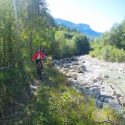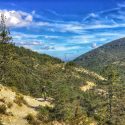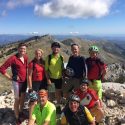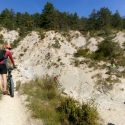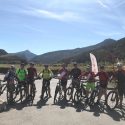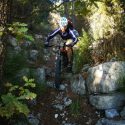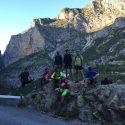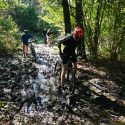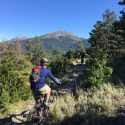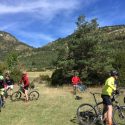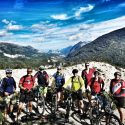Exercise COCKNEY ENDURO 2 (CE2) was a Unit Mountain Biking Expedition conducted in the high-altitude splendour of the Haute Alpes in Southern France, on routes following the final section of the Grand Route Chemins du Soleil (‘Path of the Sun’) descending from the mountainous and remote Verdon National Park through to the Mediterranean Sea.
National Reserves Headquarters, Royal Artillery (NRHQ RA), is a specialist regiment based in Woolwich, commanded by a regular RA Lieutenant Colonel who is also Commander Woolwich Station. The role of the unit’s All Arms Staff Pool (AASP) is to support the Field Army with Staff Officer support whilst deployed on operations and exercises. It also has two batteries; 221 Wessex Battery supporting the Royal School of Artillery and 225 Somerset Yeomanry Battery providing Tactical Air Controllers.
The chances for internal training are extremely constrained due to the limited commitment of 19 days per training year. Opportunities such as this expedition not only promote individual development – as will be shown below – but also help build and cement the Regiment’s bonds.
The Exercise was designed to provide the prerequisite experience for those looking to gain their Mountain Bike Leader (MBT-L) or MTB Foundation (MTB-F) qualifications in addition to earning quality mountain days towards subsequent qualifications. The Regiment deployed eight reservist riders under supervision; three were already qualified to Foundation level and the other five were all novices. Two attached Royal Army Physical Training Corps (RAPTC) instructors – also reservists – delivered the training; both were qualified to the highest possible military level as mountain bike instructors, (MTB-I), and each was highly experienced. All five novices achieved their Foundation qualification – delivered as Distributed Training.
All NRHQ personnel deployed from the home base in Woolwich, with an all-day (15 hours, including driver swops) drive in convoy (with bikes, spares, kit and essential supplies) via the Channel Tunnel to the start point in Castellane, high in the Haute Alpes of eastern Provence between Grenoble and Nice. This was a very long and cramped day, but minimised costs (relative to flights) and eased the overall planning and administration burden by deploying as a self-contained convoy.
In terms of endurance, the terrain was challenging and the group was pushed hard throughout, with a varied series of long rides each day that included lung-busting ascents up fire tracks, interspersed with sustained climbs on tarmac, technical descents (most were graded somewhere between Red/difficult and Black/severe) and the occasional blast on the flat. This tested overall group levels of cardio fitness – the compound effect of altitude (almost 2000 m in places), hill climbs, rugged descents and the sheer distances covered each day (up to 20 miles/day, including daily climbs and descents of 5000 ft) all combined to provide a wonderful challenge which the group embraced. In the true spirit of adventurous training, this hardy team of outdoorsy souls – with a shared, common passion for mountain biking – rose to the challenge and relished their shared adversity in the mountains.
Skills training was also conducted and tested, with all participants benefitting immensely from having two of the most experienced and qualified instructors in the Services actively planning, overseeing and directing each day’s activities. This included theory and practical on-the-trail lessons in riding skills, bike maintenance, navigation, nutrition, leadership, risk assessments and contingency planning. It was a genuine pleasure to watch the instructors convey their wealth of experience and confidence to the team, and there was a steady, noticeable rise in professional standards across the group each day of the week. The net output was increased rider confidence, enhanced technical knowledge and skills as well as improved individual ability to plan and lead future biking expeditions.
The beauty of adventurous training is how it develops individual confidence and group cohesion by nudging participants out of their comfort zones and forcing them to adapt and step up to new challenges. Typically, the more challenging the training; the more rewarding the experience – provided no-one gets hurt. Mountain biking is, by nature, a riskier pursuit than other adventurous training activities – but the instructors worked hard to strike the right balance between managing risk and setting challenges.
Having two world-class MTB Instructors embedded within the group ensured that risks were identified early (within the planning process) and carefully mitigated – all participants learned (at first-hand) the professional utility of conducting dynamic, daily and generic risk assessments.
The maturity of the group also played a part (average age 51); while each participant pushed themselves and each other hard, there was also a common, shared awareness of the need to be sensible and know the group’s limits. Indeed, there was no appetite to see a member of the group visiting a hospital (with all the attendant costs, hassle and negative impact on the Expedition) – so a healthy combination of prudent planning, supervision and self-policing was applied throughout each days’ riding to ensure that risks were minimised wherever possible – without compromising on adrenaline and cardio-bursting fun.
While all five novices qualified for the first rung of the mountain biking ladder, the high standard of instruction on Ex CE2 – coupled with the challenging terrain and distances covered – means that all participants achieved much more out of the week, and are now set up for success on the next level of qualification (Mountain Bike Leader) which lets individuals take groups out on the trails while bringing on other novices who might wish to try this great activity.

